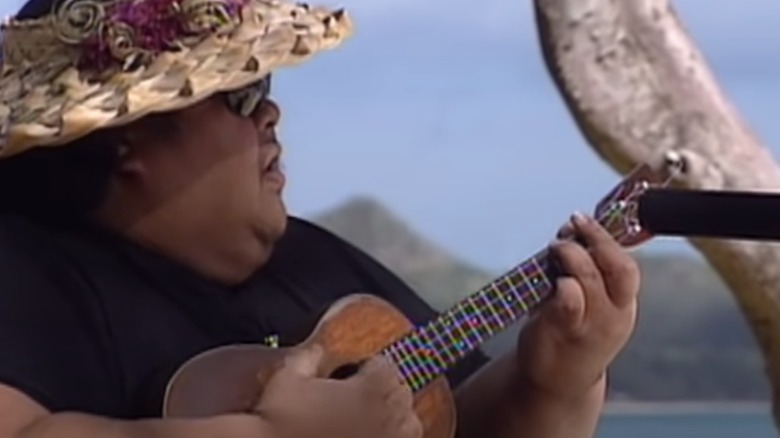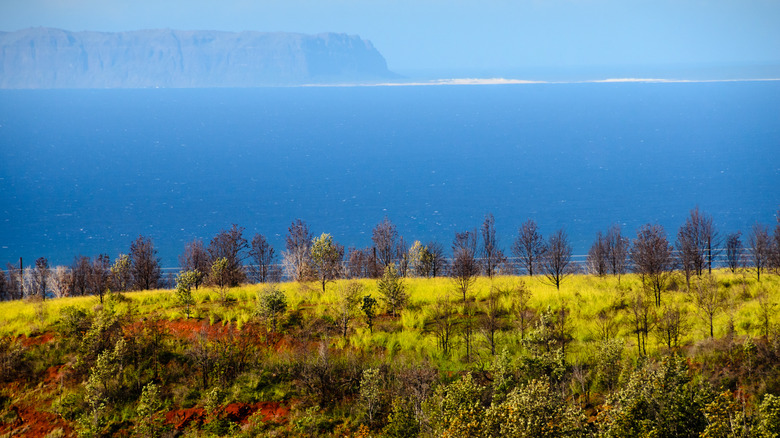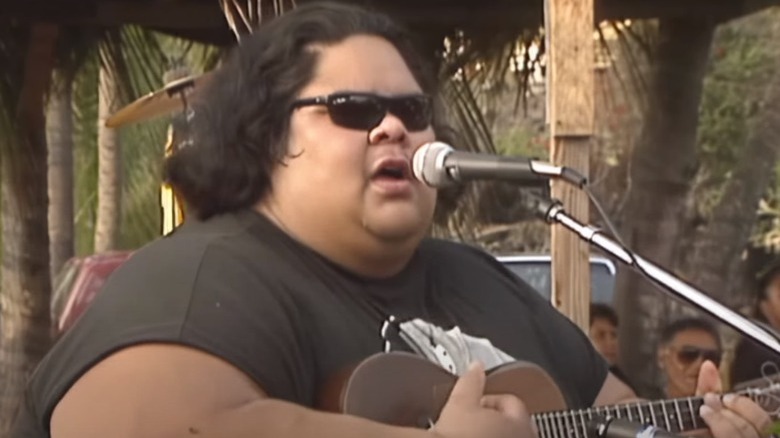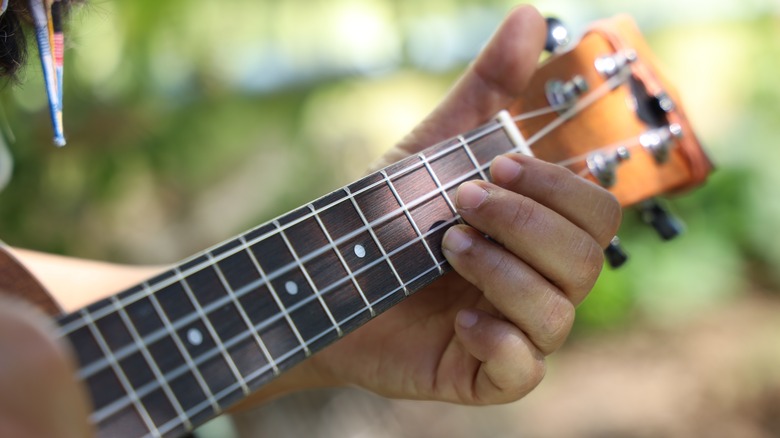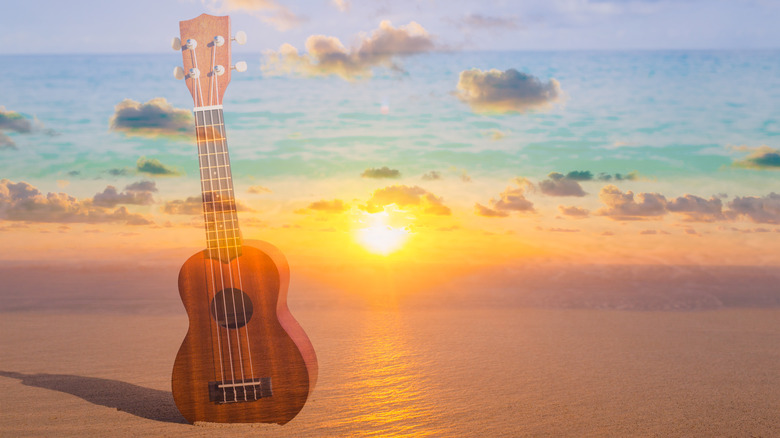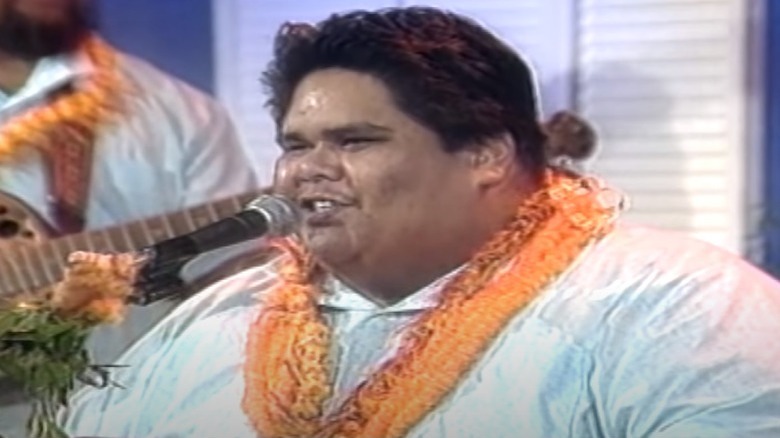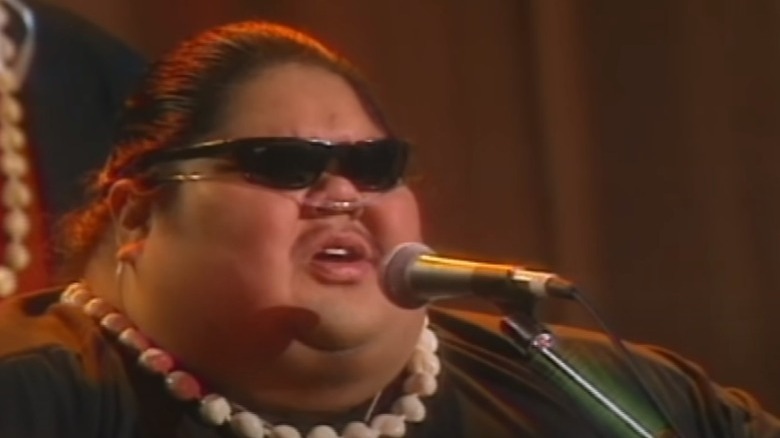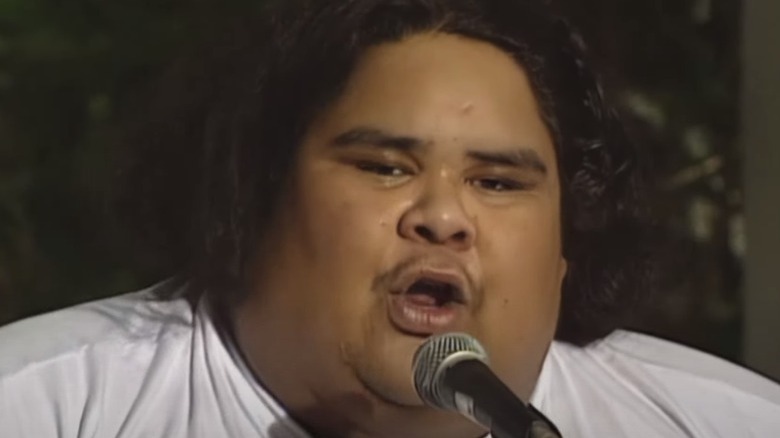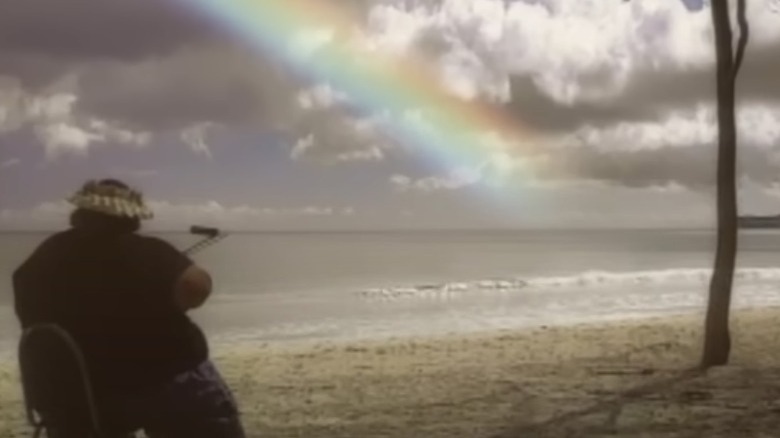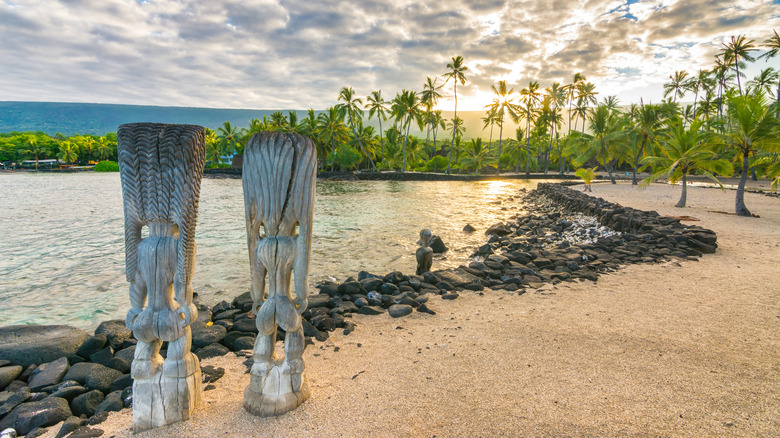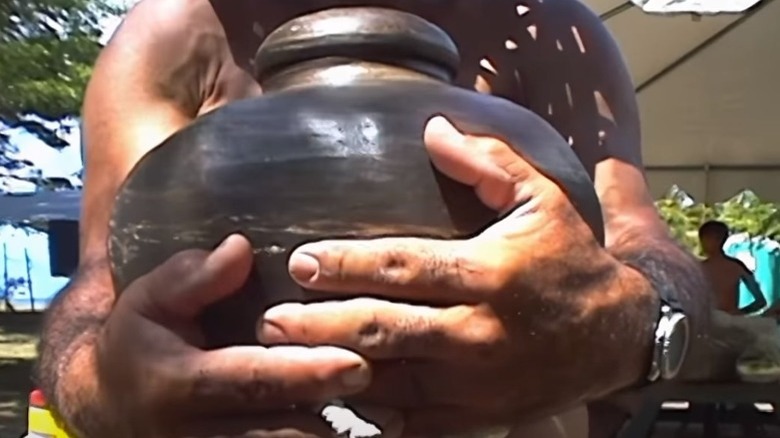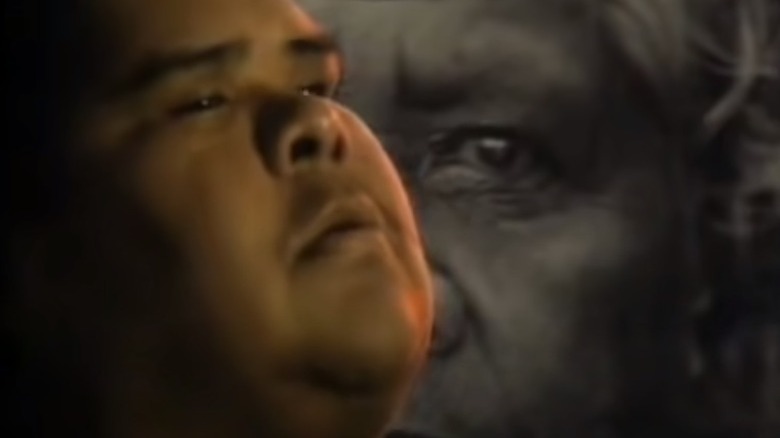The Life And Early Death Of Israel Kamakawiwo'ole
It's no secret that today's world is stressful, the news cycle is one horrible thing after another, and even if there were more hours in the day, there still wouldn't be enough time to meet obligations and get everything finished. That said, Israel Kamakawiwo'ole's rendition of "Somewhere Over the Rainbow" has the sort of sweet, gentle tenderness that's enough to move even the most cynical and overstressed person to therapeutic tears. In 2021, Billboard reported on this chart-breaking, record-setting music of Kamakawiwo'ole, and honestly, it's not surprising.
The official YouTube video has surpassed 1 billion views, but it's not without sadness: It ends with the spreading of his ashes over his beloved Hawaiian waters. Kamakawiwo'ole passed away in 1997, but very clearly his music has lived on to continue to touch people in a deeply meaningful way. After all, it wasn't until 2011 that his most famous song kicked off a run of 332 non-consecutive weeks at the No. 1 position on the World Digital Song Sales, and if that doesn't speak volumes about those who have discovered — and love — his music, then nothing will.
But who, exactly, is the ukulele player with the angelic voice? The story of Israel Kamakawiwo'ole — widely known as IZ — is filled with sadness, heartbreak, and struggles, which is perhaps why his music has continued to reach people trying to survive in an increasingly difficult world.
From the very beginning, he was unique
Israel Kamakawiwo'ole's Hawaiian heritage can be clearly heard in his music, and his connection with the islands runs deep. He was born in Honolulu in the months around Hawaii's transition from territory to U.S. state, and his mother has an even more incredible — and rare — connection to the islands.
His official online biography reveals that Evangeline Keale Kamakawiwo'ole was born on the island of Ni'ihau. Otherwise known as the Forbidden Island, it's off-limits to pretty much everyone — including other native Hawaiians.
The island can be seen by anyone standing on the shores of the larger and more well-known Kauai (pictured, with Ni'ihau in the distance), and according to ABC News, it's been privately owned since 1864. That's when it was bought from King Kamehameha V, but the off-limits part didn't really kick in until almost a century later with the outbreak of a polio epidemic. The little island closed its borders, didn't have a single case of polio, and kept its doors closed. Fast forward to the 21st century, and it's still home to just over 100 people who continue to call the 72-square-mile island home, and who continue to turn away almost all hopeful visitors. (Some fortunate few can get highly restricted access to the beach via limited tours.) One Kauai resident explained: "Ni'ihau was always like a silent sentinel out there across the ocean, giving us some comfort from storms and the wide open ocean out beyond."
His childhood was spent looking for trouble
It's no secret that a person's childhood shapes the adults they're going to become, and for Israel Kamakawiwo'ole, his earliest years were spent growing up in the Honolulu suburb of Kaimuki. It wasn't an easy childhood, though: According to his biography, "Facing Future," his parents worked nights most of the time. Jobs were difficult to come by, and while his mother hustled to find whatever work she could, his father drove a garbage truck. Meanwhile, the young Kamakawiwo'ole was shuffled between family members.
Much of his time was spent with his grandfather, who not only spoiled him, but encouraged him to partake in all of the area's finest foods to an extreme to help fill the void left by parents who were away for long hours. He also neglected the sort of life-guiding correction that Kamakawiwo'ole needed: According to his uncle, "He was a brat," and a child for whom fighting was a daily occurrence. He was regularly bullied because of his weight, was expelled from school several times, and preferred cutting classes to actually attending.
Summers were spent away from the city and instead, were spent with his grandfather on their ancestral home of Ni'ihau. While his time spent immersed in the traditional culture and values of the island would mature into a deep-seated appreciation for his ancestry, he was predictably and overwhelmingly bored by it all as a child.
His first ukulele came with an important lesson
Israel Kamakawiwo'ole's family was a musical one, and according to his biography, "Facing Future," he was just 6 years old the first time he picked up a ukulele and started participating in his family's music-making. Kamakawiwo'ole fell in love with it, and those who knew him at school recalled that he would much rather sit outside and play music than go to class.
In one interview, Kamakawiwo'ole reminisced about his earliest instruments, saying (via NPR) that he'd had a ukulele for almost as long as he could remember. His first ukulele had been a gift from his uncle, and he said, "You couldn't take the ukulele away from me. I learned, just from listening, and watching. Watching, and listening pays off. No ask questions, when you ask questions, they're not gonna tell you nothing. 'Cos it's kind of like, 'You talk too much... so go away!'"
Five years later, the 11-year-old Kamakawiwo'ole started turning music into a legitimate career, when he began performing alongside his older brother on a Waikiki catamaran boat tour.
He preferred concerts in the bathroom to classes
Israel Kamakawiwo'ole's love of music and dislike of the more organized parts of life were a running theme throughout his days. When he was older, he was theoretically enrolled in Wai'anae High School, but in his biography "Facing Future," his longtime friend Del Beazley recalled, "I saw him at school once or twice, but never in class. He'd come to school in the morning, take his ukulele, and then that's it. He'd be at the beach like, eight or nine o'clock."
Kamakawiwo'ole traded high school for the beach life after he and a friend got in trouble for holding impromptu concerts in the school's bathroom. Not only were the instruments lifted from the music department, but it got to be such a popular thing that other students were sneaking in to listen.
It was during one of his many, many days on the beach that he happened to start chatting with another aspiring musician who was cutting his community college classes. That was Jerry Koko, who invited Kamakawiwo'ole to join his group of friends the next time they got together to play. It ended up being a fortuitous meeting, and from there the group added Kamakawiwo'ole's cousin and brother. It wasn't long before it was clear the whole group just kind of clicked, and then, they had a name: the Makaha Sons of Ni'ihau. Although the roster has changed quite a bit over the years, The Makaha Sons are still performing in 2023.
His band's first concert was for a fundraiser
The Makaha Sons of Ni'ihau would go on to be one of the most famous groups playing and promoting Hawaiian music, and along with a slew of other awards, they were inducted into the Hawaiian Music Hall of Fame in 2012. (Israel Kamakawiwo'ole was inducted separately as a solo artist in 2017.) Success wasn't instant, though, and Kamakawiwo'ole and his fellow musicians definitely paid their dues.
Kamakawiwo'ole's biography, "Facing Future," tells how they started out playing all across Makaha, booking shows at venues that included birthday parties and school dances, and — of course — they were a regular feature at the parties that popped up long the island's beaches. After about a year of playing at multiple appearances and parties a day, they got what they considered their first official concert: They were headlining a fund-raising event organized for a youth football team. Their band name was featured alongside some of the heavy hitters of the day, and it made them step back and consider the fact that maybe it wasn't just a wild, pie-in-the-sky sort of dream after all. Maybe they could make it as legit musicians.
When they started booking shows at actual nightclubs, they thought they'd made it. It was just the beginning, and the year after that first fundraising concert, they recorded their first album.
He decided to go solo while in the hospital
For years, Israel Kamakawiwo'ole was content to be one of The Makaha Sons of Ni'ihau, even as other band members came and went. That included his older brother, says Vice: Skippy Kamakawiwo'ole was one of the band's founding members, and died of an obesity-related heart condition when he was just 28 years old.
According to Hawaii News Now, Kamakawiwo'ole spent 17 years with the band, and considering that he'd joined when he was 17, that was a lifetime. However, those 17 years were plagued with health problems, and those who knew him best also knew that he struggled with the belief that he was destined to live a short life. In 1993 — 11 years after the death of his brother — Kamakawiwo'ole came to the conclusion that if he wanted to leave behind a legacy that would support his wife and young daughter, he needed to go solo.
Kamakawiwo'ole was in the hospital when he called Jon de Mello, the CEO of Mountain Apple. De Mello met him at the hospital, where they sat for a very, very long conversation on Kamakawiwo'ole's exit from The Makaha Sons of Ni'ihau and what his solo career would look like. Kamakawiwo'ole wrote down the songs that had a special meaning for him, and after asking some old friends to join him, they started rehearsing while he was still in the hospital.
His partying ways were off the charts
There are plenty of words that could be used to describe Israel Kamakawiwo'ole's voice. Soothing. Mellow. Downright beautiful. While it might not seem like it's the voice of a party animal, it absolutely is.
That's according to his biography, "Facing Future." His wild ways created some conflict within the group from the very beginning, particularly between Israel and his more serious older brother. Part of the problem was his regular drug use — he famously wrote a song about marijuana, which went on to be a hit for the band — but that wasn't the end of it. A year before his brother's death, Israel was arrested after being accused of hitting a man and breaking his jaw. He served a jail sentence, then hit the town immediately upon his release.
Marriage and a child didn't change things, either, and his wife Marlene candidly recounted the first seven years they were together. She would come home from work, he would hit the town, and he'd return at 5 a.m. in varying states that depended on what he'd partaken in that night. "Years of that used to drive me nuts. I used to party when I was young, you know, high school and stuff. But somebody had to be sane and responsible." When he suffered a massive heart attack in 1989, he stopped the drugs and alcohol ... for a while, before relapsing in 1996.
He did Somewhere Over the Rainbow in a single take
Although Israel Kamakawiwo'ole has contributed to scores of songs, his most famous is without a doubt that touching rendition of "Somewhere Over the Rainbow." And, while there's a ton of stories of songs that took forever to get right, the opposite is true of his one. According to what sound engineer Milan Bertosa told Ukulele Magazine, Kamakawiwo'ole did the entire thing in one take ... at 3:30 in the morning.
Bertosa recalled that he had just been winding up a long, somewhat painful recording session with another group when his phone rang. It was another one of his recording clients who wanted to bring a buddy in to use the studio. Bertosa tried to push him off until the following day, but he wasn't taking no for an answer. He recalled, "Then he puts Iz on the phone, and he's got this soft voice and he's really polite and really sweet, kind of the embodiment of what a nice Hawaiian person is like." Kamakawiwo'ole's personality is what sold him, and when he got there, he sat down with his ukulele and nailed it in one take. He went on to do "White Sandy Beach," too, and Bertosa was so moved by the song that he said, "After those 15 minutes I was thinking, 'This is what I'm supposed to be doing for a living.'"
When Bertosa passed away in 2023 after suffering a heart attack, Hawaii News Now lauded him as a champion of traditional Hawaiian music.
He was a vocal supporter of Native Hawaiians' fight for rights
Before Hawaii was a U.S. state, they were their own sovereign kingdom. According to Honolulu Civil Beat, the fight for native rights and recognition is still ongoing, and along with being a champion of traditional music, Israel Kamakawiwo'ole has also been hailed as being a Hawaiian activist.
Was he? That's actually a complicated question, and it's one that his Mountain Apple producer denies. However, biographer Dan Kois says that there are plenty of ways to support a cause that doesn't involve marching on the front lines and holding up signs. He cites some of Kamakawiwo'ole's other songs: "Hawai'i '78," for example, is a heartrending song about the changes that the islands have undergone, and what the ancient rulers would think if they saw what had happened to their beloved lands.
Kois suggests that any doubts about where Kamakawiwo'ole's loyalty was can be explained by the fact that after one particular performance, where he lauded the activism of Bumpy Kanahele, he started getting phone calls warning him that he was offending his white audience. He backtracked — a bit — by saying that anyone could embrace the heart and spirit of the real Hawaii, leading Kois to write: "It's important to remember that Israel wasn't just an angel of aloha. He was an activist, even if he was one who didn't man the barricades."
He died at 38 years old
Just four years after embarking on his solo career, Israel Kamakawiwo'ole passed away. According to Vice, the official cause of death was a series of obesity-related illnesses that culminated in respiratory failure. Kamakawiwo'ole — who had been relying on an oxygen tank for a while, and required the assistance of a forklift to get on and off stages — was 38 years old at the time of his death, and the entirety of the islands mourned the loss of one of their native sons. Radio stations were bombarded with calls from tearful fans, flags flew at half-mast, and he became only the third person to lie in the state's Capitol.
Facing one's own mortality is never easy, but Mountain Apple producer Jon de Mello explained to NPR that he'd had a beautiful view on life and death. Kamakawiwo'ole had told him, "I was scared when I lost my mother, my father, my brother, my sister. ... but I'm not scared for myself for dying. Because I believe all these places are temporary. This is just one shell. ... When our time come, don't cry for me. Don't cry for me. Plant a tree... kind of small, then I'll grow big."
Kamakawiwo'ole was cremated after being visited by tens of thousands of people, and nearly as many turned out to escort his ashes on their final journey back to O'ahu's Makua Beach. His ashes were spread in the water, and every year, fans and loved ones alike continue to take an anniversary swim in the same place.
A Google Doodle captured his essence, according to those who knew him best
Israel Kamakawiwo'ole would have turned 61 years old in 2020, and to celebrate his life, Google commissioned not only a Google Doodle, but an animated version of his famous "Somewhere Over the Rainbow" video. Done in conjunction with Asian Pacific American Heritage Month, the video was illustrated by artist Sophie Diao, and to make sure she paid him proper tribute, she reached out to those who knew him best — including his widow, Marlene, and Mountain Apple producer Jon de Mello.
It was his widow who gave Diao a heartfelt tribute that would form the basis of her work. Diao told Honolulu Magazine, "When I asked Jon and Marlene what Israel would've wanted the Doodle to be like, Marlene (without missing a beat) responded, 'Happy. Life is beautiful. He loved life.' They also said that no matter what challenges came up in his life, he never lost his determination to keep on going."
